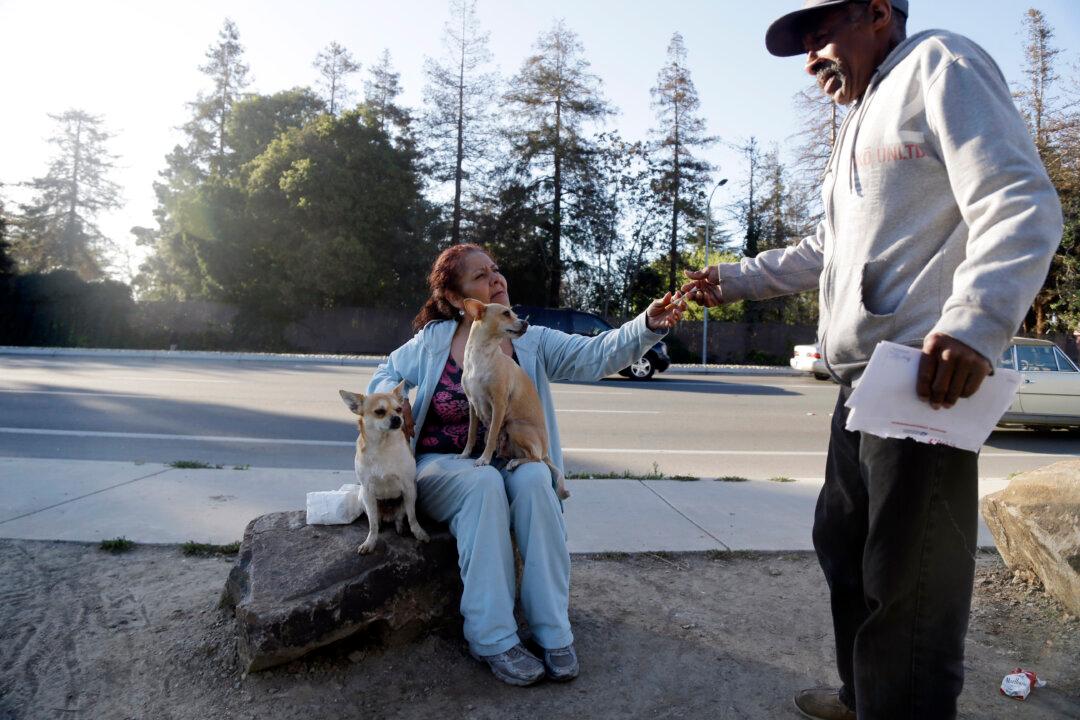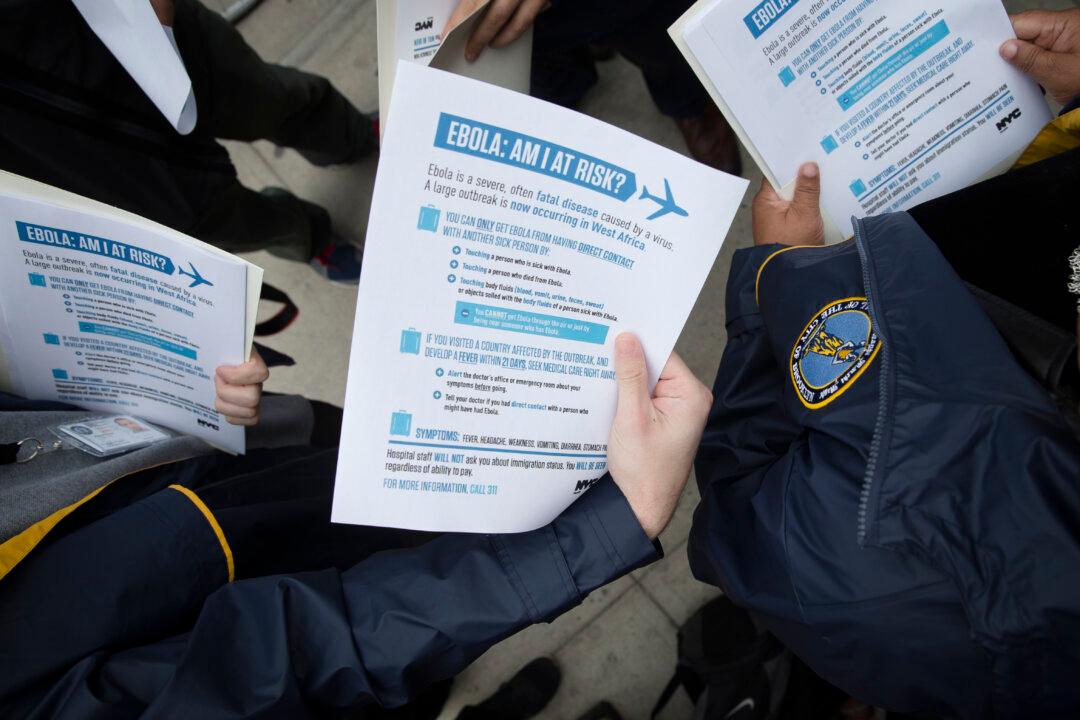SAN JOSE, Calif.—She is a disheveled woman, hair mussed, upper teeth gone, muddy walking cane taped together. But in the Jungle, Maria Esther Salazar is a person to be reckoned with.
Her shelter, supported by tree branches, is a gathering place. Inside, friends huddle around a folding table in armchairs, smoking pot, dozing, sharing stories, arguing. Outside, they squat by her cooking fire frying pancakes or warming soup, handouts from Sunday church groups. Her son Bobby lives with his girlfriend just a few tents away. Her weed connection has coffee ready for her in the morning at his tent.
It’s easy to forget that the geeks and Web entrepreneurs of Silicon Valley are making their millions just miles away. In the mile-square Jungle — believed to be the nation’s largest homeless encampment — Salazar and hundreds of others live in tents, makeshift shacks, caves and tree houses along polluted Coyote Creek, spending their days and nights under tarps or blankets, in various states of mental confusion and intoxication.
Salazar has been either homeless, in jail, or squatting at someone else’s house for 30 years. But that may be about to change.
On a cool Tuesday morning in February, Salazar limps out of her fenced compound. A passing social worker, a city homeless coordinator and a psychologist are making their weekly rounds.
“Hey you,” she shouts, her voice gravelly beyond her 50 years. “You’re supposed to be helping me.”
They have no answer for her. But when the social worker returns to her desk, she finds the news she had been waiting for: in a county with a seven-year, 20,000-person waiting list she'd never top, Salazar had finally qualified for housing support: a new locally funded, $1,295 monthly subsidy aimed at ending chronic homelessness awaited her.
Now Maria Esther Salazar, a woman with a criminal record, two dogs, no phone and no identification has to find an apartment in one of the most expensive housing markets in the U.S., or the subsidy could disappear.
And she isn’t sure she wants to leave.
* * *
San Jose, the 10th largest city in the U.S., is at the heart of the Silicon Valley, a region leading the country for job growth, income, innovation and venture capital. Tech giants Google, Apple, Yahoo, eBay, Facebook, Intel and many more call the 1,850 square mile stretch of business parks, small cities and suburbs south of San Francisco home. As tech roars back from the recession, housing costs have soared.
An average home price is $1 million, and two bedroom apartments start at $1,700. The widening gap between the wealthiest and everyone else is palpable. Freeways back up with commuters who work, but cannot afford to live, in the area. There are daily lines at food pantries. Here, according to federal data, you'll find one of the largest unsheltered populations in the country; homeless people camp on corners, under bridges, along creeks.
Residents of the Jungle are well aware of the affluent world that lies just outside its borders. They call it “going up,” walking the dirt path up to busy Story Road, where fleets of cars, rumbling delivery trucks, packed city buses and minivans of families heading to Happy Hollow Park and Zoo across the street never notice the despair below. It’s just one long block from the city’s municipal ballpark and San Jose State University’s stadium. Less than a mile away, downtown San Jose is booming.
The Jungle is home at times to as many as 350 residents, almost all San Jose locals. Snaking trails wind through trees and bushes, with Spanish-speaking sections and neighborhoods like Little Saigon, where Vietnamese residents have dug large rooms into steep hillsides. They squat by the creek to wash dishes and get water, and stand watch over each other at night.
“I’m blessed because every day is a blessing, but the Jungle is tough,” says longtime resident Shante Thomas. About three months ago she awoke being beaten up: she was stuck in her right eye with a stick and blinded.
There are fenced communes with “Stay Out” signs, a tree house built by an out of work carpenter, hand-dug latrines. And — stretching out toward the freeway in a more open field of what used to be the city dump — a string of severely mentally ill people who burst from their tents screaming and punching at unseen terrors. A man staggers by, bleeding from his ear after being hit with a shovel. A pregnant woman calls for help on the cold dirt under a tarp, her legs too swollen to get up. Some residents have hauled in generators to power televisions and stereos but most use candles and flashlights when the sun goes down.
“We’re like the scum of the earth,” says Salazar. “We’re like nobody.”
The Jungle and several hundred smaller encampments in the region are the consequence of urban sprawl, with large open spaces that are not parks, and thus without rangers. Similar tent cities have sprung up in recent years in places like Ann Arbor, Michigan, where law enforcement evicted 78 residents from self-governed Camp Take Notice in the fall. The 30 residents of Camp Quixote in Olympia, Washington, organized into a non-profit and now live in tiny cottages with a shared kitchen, laundry and showers.
Eventually, environmental and social concerns prompt homeless encampments to be cleaned out or cleaned up. San Jose has swept hundreds of encampments in recent years, and many of those homeless now live in the Jungle, where piles of human waste, cast-off clothing, discarded food and car parts rot. The city’s plan is to clean it out. No one will say exactly when.
* * *
Bicycles, cigarettes and drugs are the key currencies in the Jungle. No one has much cash, and many, like Salazar, subsist on $147 a month in food stamps and another $200 in general assistance.
Pets are crucial in this world, often eating before their owners. There are cats and kittens, dogs large and small, chickens, ducks, even a bunny, Dillon, whose owner pushes him in a stroller watched over by a handsome German shepherd KayKay. Some dogs, like a black, snarling pit bull chained to a tree, occasionally attack, and KayKay gets fierce if anyone messes with the bunny. But most pets, including Salazar’s Chihuahuas, Minneapolis and Chico, spend their days on their owners’ laps or skipping behind their heels as they visit friends and take care of business.
Salazar says she likes the Jungle. It beats jail.
“No one comes down to bother us. No cops or nothing,” she says. “When I’m in jail I worry about my dogs. There’s a lot of stress there. It’s so hectic.”
Salazar has a three-foot high stack of criminal case files at the county courthouse. She’s been arrested more than 35 times, convicted of 17 felonies, almost all drug related.
She was born in Harlingen, Texas; her mother moved her and her seven siblings to San Jose when she was a toddler.
At 11, everything fell apart.
“Kidnap, Sex Offenses: 2 S.J. Men Held On 13 Charges,” read the San Jose News headline
The article describes how “the young victim was picked up, driven to three different locations, and forced at knifepoint to comply with sexual demands” over three days. She remembers seven attackers, repeatedly raping her.
Forty years later, she tears up.
“Now I make a joke about it,” she says softly, smiling and crying at the same time. “I say I’m the president of the man-haters club.”
Salazar avoided people and school for years, started smoking crack at 19, and then began getting arrested, over and over again. Her latest stint, an eight-month sentence for drug possession, ended in January. She moved back into the Jungle, where an ex-boyfriend had cared for her tent and dogs.
Salazar’s had four children but raised none. Her mother or foster parents took them in. Two adult daughters now have kids of their own; one recently became a nurse, another drives a school bus. One is getting married this summer and has invited her mom.
“It’s hard for them to see me now,” said Salazar, but they do visit.
She lost track of one son after child protective services terminated her parental rights while she was in jail. She'd like to find him. Another is her neighbor, who lives in a small tent strewn with jackets and towels, bike rims and chains, rotting plates of pasta.
Salazar has lived, at times, with her daughters. She’s also lived in shelters or with boyfriends.
She’s never worked, she says. “Not a day in my life. Never.”
And she says she never took any welfare, perhaps not realizing her $347 a month in public assistance is just that.
* * *
For almost two years of drought, the Jungle was virtually rain-free. But that changed in March when heavy storms rolled in one night.
One man fell into the creek and had to be rescued by firefighters. Mud was everywhere, in tents, cooking pots, blankets and clothes. By sunrise, as the first rains tapered, shovels came out and the place was buzzing with people digging trenches to drain tent floors. One man carried a post-hole digger from campsite to campsite, offering services. A woman named Heidi pulled a Boy Scout handbook out of her backpack and realized she needed a tent pole to make a peak, not a valley, with her roof.
Heidi struggled for hours trying to dig a drainage ditch.
“I’m working like a Hebrew slave,” she says, panting as she pauses to chat. “This is the United States of America and we should be helping people a whole lot better than what we’re doing.”
Salazar’s tent was water tight, but she isn’t happy amid the omnipresent trash: torn lingerie, a half-eaten corn cob, a sticky Starbucks cup, molding bread, a dented deodorant aerosol can.
“I'll be glad to get out of this hell,” she says. “That was a very rough night.”
Window installer Juan Gonzalez, who moved into the Jungle two weeks earlier, takes advantage of the wet soil to cut a staircase into the hillside. He builds banisters with castoff lumber, and stacks pallets on a platform for his tent.
“It’s not so bad,” he says in Spanish. “Everyone takes care of everyone.”
A team of evangelists arrives, passing out bottles of water and plastic bags.
A sopping wet, powerfully built man nicknamed “D'' who lives alone on a steep embankment ties a rope to climb up the slick mud.
“Any spot is a good spot as long as you live right,” he says, cooking a mixture of potato chips, Spam, a burrito end and a handful of mushrooms over a fire burning in a hole-punched oil can. His hair is shaved to a diamond point; shell-studded arm bands and a golden rope over his shoulders make him look like a ninja. His socks are drenched. He has no shoes.
“I just don’t like society and everything we are becoming,” he rambles, talking about power and energy, God and humanity. “I will not go up. And I don’t need shoes.”
* * *
When it comes to solving homelessness, says Jennifer Loving, “We have completely failed.”
Growing up, Loving’s family ran a church in Venice Beach Calif., which served as a shelter for anyone who needed a place to stay; she’s dedicated her life to housing homeless people. For years she tried the traditional model — move someone into a shelter, then transitional housing, and then, if they’re sober and mentally stable, house them.
Now, as executive director of Destination: Home, she is spearheading a new, concerted effort in San Jose to house people, a far cheaper alternative to the rotating circuit from the emergency room to local jail. Studies vary, but the cost of each person living on the street is estimated about $60,000, while the cost of housing someone is about $16,000 a year.
“I know this sounds incredibly obvious,” she said, “but we’re housing them first.”
Once someone has an apartment, a social worker with a relatively low case load is assigned the job of keeping them housed.
In a 24-month pilot, they’ve housed 630 people, 76 percent of whom were still in their home a year after moving in. One man slept in a tent, inside his apartment, for three weeks. Another, an amputee who had been sleeping in a creek bed, stopped making his near-daily trips to the emergency room.
Dozens of cities have seen similar results from Housing First initiatives, including New York, Los Angeles and Atlanta. Now that it’s proving effective in San Jose, Loving is pitching a Silicon Valley disruptive moonshot: $500 million would be enough to house the 2,500 chronically homeless people in the county, she says.
“This is not giving out a blanket and a bowl of soup,” said Loving. “This is solving one of the worst crises we have in the U.S. today.”
* * *
In April, Salazar’s social worker found a studio apartment for her.
No dogs — no dice.
Then there was a motel room. Salazar said no again.
“I'd just get back into trouble if I stayed right there on the strip where everyone is hustling,” she says.
There was a possibility in Gilroy, a farming town an hour south. Too far, Salazar decided.
She got an extension on her housing voucher, and a bus pass she used to visit the homeless shelter for a shower. She got an identification card for the first time in 13 years but it was stolen two days later. She saw a doctor, got a medical card, made an appointment with the DMV to get her very first driver’s license. She cleaned up her tent and added on with more tarps and construction cast-offs, building a wooden fence with a swinging gate.
“I’ve got a living room here, kitchen here, master bedroom,” she says, pushing tarps aside.
But what about moving out?
“I can’t really see that happening anymore,” she says.
But the Jungle is feeling grim. A man was found dead in his tent. The police came down, and the coroner.
“Can you believe it? There’s his body, right there,” says Salazar, her eyes wide.
* * *
Rumors spread in May that city authorities are going to sweep the camp. If Salazar’s still there come July, “for reals, I'll take the first thing I can get.”
She’s still caught up in life in the Jungle. Today is laundry day. This involves filling a shopping cart with four large garbage bags of clothes and blankets, pushing it up a 100 yard dirt hill and along two blocks to the Laundromat where she fills 12 washing machines.
But her life is beginning to change. A psychiatrist has certified Minneapolis and Chico as “therapeutic companion dogs.” She gives away their puppies and starts imagining a home, with furniture and a television, a closet for her shoes.
“All of this is going to be overwhelming for me,” she says, sitting with friends in a tent.
She’s silent for a few minutes, petting the dogs and looking around her books and reading glasses, melting candles. “But I’m sure I can do it.”
A month later, it appears her dreams are about to come true. She whispers urgently that she’s been accepted into an apartment. Her housing voucher will cover all but $20 of the $1,315 a month rent.
She says she’s told no one in the encampment, not even the six friends who are at that moment smoking and drinking, sharing drugs, showing each other their knives, eating pancakes, in one of her two tent rooms.
“I’m scared they’re going to see everything getting packed,” she says. Her white t-shirt and tight jeans are filthy with dirt and food. She has yet another new bicycle, her fifth since February.
Her neighbor in the encampment recently got housed — he put his place up for auction before he left. She doesn’t know what she'll do with hers.
“I’m kind of scared. I’ve never had to do anything like this in my life,” she said.
She’s never paid her own rent, locked her own door. Signing up for utilities terrifies her.
“I’m going to be in the dark in my apartment. I’m not going to turn the lights on, so I don’t have to spend all my money on an electricity bill,” she says.
She has no plans to work.
“Oh no, this is my retirement. I’m going to kick back now, do grandparent stuff, go to the amusement park.”
Will she miss friends in the encampment?
“I’ve had enough of people to last me a lifetime here in the Jungle,” she says.
* * *
At 1 p.m. on Friday the 13th of June, Salazar’s social worker is waiting to meet her “up top” with her belongings and dogs. But Salazar, hair clean and wet, mascara thick and in a new, low cut tank dress, isn’t nearly ready. She has four shopping carts loaded with bags, but many more piles of clothes, food, pots and pans, bottles and furniture remained. Chico is missing. And there’s her marijuana, her bong, her joints — could she bring them?
They couldn’t have picked a more perfect moving day — the sky is cloud free, a cool breeze wafts through the Jungle, carrying happy screams and laughter from the roller coaster at Happy Hollow across the street, crowded with school children starting summer vacation.
She scrambles into her social worker’s car with a few bags and Minneapolis, scrambling around her lap, licking her cheeks.
Ten minutes later, but a world away, they pull into Parkside Terrace, a clean, neat two-story apartment complex tucked away from busy streets. Salazar checks out the clubhouse, the park and barbeque areas, fitness center, community playground. The dog rolls on the grass outside the leasing office while Salazar nervously helps herself to cookies and coffee.
She'll miss the Jungle, she says. “Everybody comes to my house for anything they need. It just so happens everyone shows up when I’m cooking.”
Her social worker and housing specialist James Worley from nonprofit Abode Services explain that $1,295 rent will automatically be paid through a combination of public and private funds. The remaining $20 will be sent from the Santa Clara County General Services Agency out of her account.
A leasing manager explains the apartment rules. Smoking is OK. Pets must be on a leash. No disruptive parties.
Then he hands her the keys.
“I love it! Everything is so white! It’s my favorite color!” says Salazar, bursting into her new home, a second-floor, carpeted, corner apartment. Her social worker carries in a box of bread, cheese, cereal and canned spaghetti, a bucket of cleaning supplies, a twin set of bedding, towels, toiletries, and a “kitchen starter set.”
“I’m going to make everybody take their shoes off when they come to visit,” says Salazar, running her hand over the kitchen counters, stepping in and out of the closet, turning on the tap.
But now it’s time for the social worker to leave. And it’s time for Salazar to move on with her life.
She isn’t ready.
Stepping out of her apartment, she forgets to lock the door. She asks her social worker for a ride back to the Jungle. In 10 minutes she’s back in her tent, passing snacks and smokes around as friends stumble in. She says a friend is asking another friend with a truck to help her move the rest of her stuff. She says she might give her tent and bed away. The hours pass, as they sit around a table strewn with McDonald’s wrappers, rags, ashtrays, dried out carrots, ice tea cans, a half-finished Big Gulp.
She looks at her muddy carpets, and says she'll need them in her apartment as well, to protect the clean ones. But she’s not planning to leave tonight.
Perhaps she was just more comfortable in the Jungle.
“You know what? Right now I am,” she says. “And now that I have a key, I can come and go over there anytime I want.”
* * *
A week and a half later, Salazar is spending less and less time in the Jungle. She feels safer at the apartment, but it took a while to settle in.
“I don’t know how I did it,” she says. “That Jungle was just in me.”
Why, Salazar is asked, is the government housing her, feeding her, providing her with her psychiatric medications and so much other care?
“I don’t think the government had anything to do with it, I think it was God. If the government knew who they were helping they would stop in a heartbeat. I don’t believe I have anything coming, I don’t believe I should be asking for anything. A lot of people who worked hard their lives, I’m sure they’re going to be pretty upset if they see what I’m getting. But they don’t know the relationship I have with God.”
A pause.
“I could be wrong. Maybe I’m giving Him too much credit.”
After some fighting, she has given her rambling, trashy, makeshift tent to her son Bobby. “It was a bit of chaos,” she says.
He’s moved in.
Copyright 2014 The Associated Press. All rights reserved. This material may not be published, broadcast, rewritten or redistributed.




